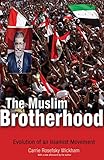The Muslim Brotherhood : Evolution of an Islamist Movement - Updated Edition / Carrie Rosefsky Wickham.
Material type: TextPublisher: Princeton, NJ : Princeton University Press, [2015]Copyright date: ©2015Edition: Updated edition with a New afterword by the authorDescription: 1 online resource (424 p.)Content type:
TextPublisher: Princeton, NJ : Princeton University Press, [2015]Copyright date: ©2015Edition: Updated edition with a New afterword by the authorDescription: 1 online resource (424 p.)Content type: - 9780691163642
- 9781400866243
- 322.4/20956 23
- BP10.I385
- online - DeGruyter
- Issued also in print.
| Item type | Current library | Call number | URL | Status | Notes | Barcode | |
|---|---|---|---|---|---|---|---|
 eBook
eBook
|
Biblioteca "Angelicum" Pont. Univ. S.Tommaso d'Aquino Nuvola online | online - DeGruyter (Browse shelf(Opens below)) | Online access | Not for loan (Accesso limitato) | Accesso per gli utenti autorizzati / Access for authorized users | (dgr)9781400866243 |
Browsing Biblioteca "Angelicum" Pont. Univ. S.Tommaso d'Aquino shelves, Shelving location: Nuvola online Close shelf browser (Hides shelf browser)

|

|

|

|

|

|

|
||
| online - DeGruyter Thinking About the Presidency : The Primacy of Power / | online - DeGruyter A Century of Genocide : Utopias of Race and Nation - Updated Edition / | online - DeGruyter Communities of Violence : Persecution of Minorities in the Middle Ages - Updated Edition / | online - DeGruyter The Muslim Brotherhood : Evolution of an Islamist Movement - Updated Edition / | online - DeGruyter Development Macroeconomics : Fourth Edition / | online - DeGruyter Government Paternalism : Nanny State or Helpful Friend? / | online - DeGruyter Ideas of Liberty in Early Modern Europe : From Machiavelli to Milton / |
Frontmatter -- Contents -- Preface -- Acknowledgments -- Note on Transliteration -- CHAPTER ONE. Conceptualizing Islamist Movement Change -- CHAPTER TWO. The Brotherhood's Early Years -- CHAPTER THREE. The Brotherhood's Foray into Electoral Politics -- CHAPTER FOUR. The Wasat Party Initiative and the Brotherhood's Response -- CHAPTER FIVE. The Brotherhood's Seesaw between Self-Assertion and Self-Restraint -- CHAPTER SIX. Repression and Retrenchment -- CHAPTER SEVEN. The Brotherhood and the Egyptian Uprising -- CHAPTER EIGHT. Egypt's Islamist Movement in Comparative Perspective -- CHAPTER NINE. The Muslim Brotherhood in (Egypt's) Transition -- Afterword to the Paperback Edition -- End notes -- List of Interviews -- Selected Bibliography -- Index
restricted access online access with authorization star
http://purl.org/coar/access_right/c_16ec
Following the Arab Spring, the Muslim Brotherhood achieved a level of influence previously unimaginable. Yet the implications of the Brotherhood's rise and dramatic fall for the future of democratic governance, peace, and stability in the region are disputed and remain open to debate. Drawing on more than one hundred in-depth interviews as well as Arabic-language sources never before accessed by Western researchers, Carrie Rosefsky Wickham traces the evolution of the Muslim Brotherhood in Egypt from its founding in 1928 to the fall of Hosni Mubarak and the watershed elections of 2011-2012. Highlighting elements of movement continuity and change, Wickham demonstrates that shifts in Islamist worldviews, goals, and strategies are not the result of a single strand of cause and effect, and provides a systematic, fine-grained account of Islamist group evolution in Egypt and the wider Arab world.In a new afterword, Wickham discusses what has happened in Egypt since Muhammad Morsi was ousted and the Muslim Brotherhood fell from power.
Issued also in print.
Mode of access: Internet via World Wide Web.
In English.
Description based on online resource; title from PDF title page (publisher's Web site, viewed 30. Aug 2021)


